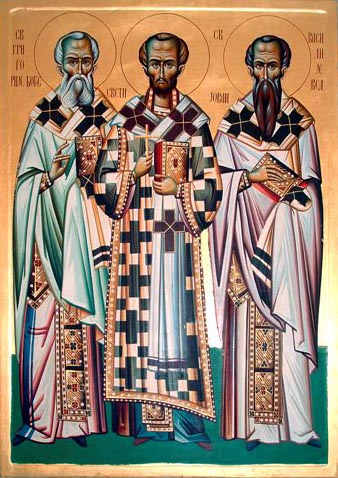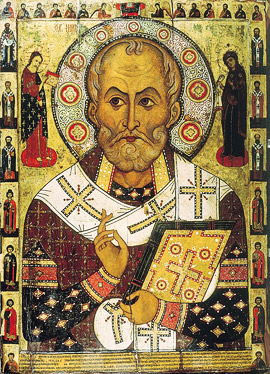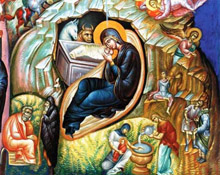Calendar
Synaxis of the Three Holy Hierarchs
13. February 2012 - 10:57 The Synaxis of the Three Holy Hierarchs: Basil the Great, Gregory the Theologian and John Chrysostom: During the eleventh century, disputes raged in Constantinople about which of the three hierarchs was the greatest. Some preferred St Basil (January 1), others honored St Gregory the Theologian (January 25), while a third group exalted St John Chrysostom (January 27 and November 13).
The Synaxis of the Three Holy Hierarchs: Basil the Great, Gregory the Theologian and John Chrysostom: During the eleventh century, disputes raged in Constantinople about which of the three hierarchs was the greatest. Some preferred St Basil (January 1), others honored St Gregory the Theologian (January 25), while a third group exalted St John Chrysostom (January 27 and November 13).
Dissension among Christians increased. Some called themselves Basilians, others referred to themselves as Gregorians, and others as Johnites.
Some argued for Saint Basil above the other two because he was able, as none other, to explain the mysteries of the Faith, and rose to angelic rank by his virtues. The partisans of Saint Chrysostom retorted that the illustrious Archbishop of Constantinople had been no less zealous than Saint Basil in combating vices, in bringing sinners to repentance and in raising up the whole people to the perfection of the Gospel. According to a third group, Saint Gregory the Theologian was to be preferred to the others by reason of the majesty, purity and profundity of his language. Possessing a sovereign mastery of all the wisdom and eloquence of ancient Greece, he had attained, they said to such a pitch in the contemplation of God that no one had been able to express the dogma of the Holy Trinity as perfectly as he.
St. Nicholas
20. December 2011 - 12:01 A Dedicated Servant of God
A Dedicated Servant of God
More than 1,600 years ago, in the year 270 AD, St. Nicholas was born not far from Myra, in a land that is now part of the country of Turkey. In those days Orthodox Christians were persecuted for their faith. It wasn't easy to be a Christian. Many of them were tortured and executed because they believed in Christ.
Nicholas was taught by his parents to love the Lord with his whole mind, heart, soul, and with ail his strength. When they died he inherited their money. He used this to help the poor, the hungry, and the sick. Whenever he helped anyone he did it secretly, so that only God would know, He did not want praise from people; he wanted his reward to be only in Heaven.
Nativity Fast
29. November 2011 - 9:35 The establishment of the Nativity Fast, as well as other multi-day fasts relates to the ancient times of Christianity. But already from IV century St. Ambrosius of Milan, Philistrius and St. Augustin mention the Nativity Fast in their works. In V century Leo the Great wrote about the Nativity Fast . At first the Nativity Fast lasted seven days for Christians, and for the others - a bit longer. At the Council of 1166 when was held in the time of the Constantinople Patriarch Luke and Byzantine emperor Manuel a forty-day fast was ordered to be observed by all Christians before the great feast of the Nativity of Christ.
The establishment of the Nativity Fast, as well as other multi-day fasts relates to the ancient times of Christianity. But already from IV century St. Ambrosius of Milan, Philistrius and St. Augustin mention the Nativity Fast in their works. In V century Leo the Great wrote about the Nativity Fast . At first the Nativity Fast lasted seven days for Christians, and for the others - a bit longer. At the Council of 1166 when was held in the time of the Constantinople Patriarch Luke and Byzantine emperor Manuel a forty-day fast was ordered to be observed by all Christians before the great feast of the Nativity of Christ.
Christian Fasting
28. November 2011 - 13:53The life of each Orthodox Christian should be ascetic. Without our spiritual and physical effort, aided by the grace of the God, it is impossible to free of a power of sin and to unite with the Lord. That is why Fasting in the Orthodox spirituality holds a very important place and without it there is no progress in any Christian virtue. In the distant past, the concept of fasting included the complete abstinence from any food, and later took on the meaning of abstaining from one type of food called "fatty", ie. the one that contains animal fat, but at certain times and food that is prepared on vegetable fat. A special kind of fasting is "dry eating" which means using of non-cooked, dry fasting food.
The Life of St. Stephen of Decani, King of Serbia
24. November 2011 - 9:38 St. Stephen of Decani was born as the eldest son of the saintly King Milutin (Stephen Uros II) and his wife Elizabeth, a Hungarian princess. Living at the court of his parents, the heir-apparent received a good education, his mind exercised by study of the language and writings of his people, and his heart strengthened by study of the Holy Scripture and the teachings of the Orthodox Faith.
St. Stephen of Decani was born as the eldest son of the saintly King Milutin (Stephen Uros II) and his wife Elizabeth, a Hungarian princess. Living at the court of his parents, the heir-apparent received a good education, his mind exercised by study of the language and writings of his people, and his heart strengthened by study of the Holy Scripture and the teachings of the Orthodox Faith.
The good fruit of his upbringing proved itself when King Milutin was forced to send him as hostage to the Tartar chief Nogyi. In spite of the potential dangers, Stephen was obedient to his father's will and did not resist, trusting his life to the Lord. And his hope was not in vain. He eventually made friends with one of the Tartar nobles, who succeeded in assisting his safe return home.
Monday of the Holy Spirit
8. June 2009 - 12:22
 After the Ascension of Christ His disciples stayed in Jerusalem and in one room at the Zion frequently gathered and together they prayed the Lord awaiting impatiently the promised Comforter, The Holy Spirit, who proceeds from the Father. Matthias was voted in to replace Judas among the twelfe.
After the Ascension of Christ His disciples stayed in Jerusalem and in one room at the Zion frequently gathered and together they prayed the Lord awaiting impatiently the promised Comforter, The Holy Spirit, who proceeds from the Father. Matthias was voted in to replace Judas among the twelfe.


